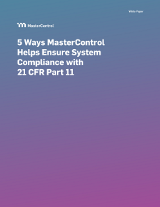
GxP Lifeline
Understanding GxP Predicate Rules Is Key to Compliance With FDA 21 CFR Part 11

FDA 21 CFR Part 11 (also simply called Part 11 in common instances) designates that electronic records and signatures are as valid as paper records and handwritten signatures. When the regulation was enacted in 1997, it was lauded as a landmark rule. At long last the use of electronic record-keeping systems is permitted in complying with the previously instituted regulatory requirements that applied to paper-based systems, also known as U.S. Food and Drug Administration (FDA) predicate rules.
Predicate Rule Definition
A predicate rule is any FDA regulation that requires a company to maintain certain records and submit specific information to the agency as part of compliance. Although predicate rules originally applied to paper records with handwritten signatures, due to Part 11 they are also applicable to electronic records and signatures used for compliance purposes.
Part 11 requirements are not meant to replace or override other existing FDA regulations pertaining to signatures and records. They are simply a modern extension of the requirements for records and signatures that must be met by companies that use digital systems to manage compliance-related processes and activities.
FDA 21 CFR Part 11 Growing Pains
After its initial introduction, many organisations expressed confusion about the specific applications of 21 CFR Part 11 and how the FDA would go about enforcing it. It did not take long before the praises for the highly anticipated regulation turned into criticisms.
Yet, after much discussion from all sides and endless speculation over the years, this much is certain: Part 11 is here to stay, although the FDA recognises that more succinct guidelines than can be found in the current agency guidance may be needed as times and technologies change.
‘The regulation won't go away,’ Janet Woodcock, director of the FDA’s Center for Drug Evaluation and Research (CDER), said in an interview with BIO-IT World. ‘However, while we won't rescind it, we may revise it.’ (1)
Symbiosis With FDA Predicate Rules
Regardless of how any potentially forthcoming agency guidances might add to or change the focus of specific FDA 21 CFR Part 11 aspects in the future, there is one constant that will invariably hold true: it will always work in tandem and maintain a synergistic relationship with FDA predicate rules. Therefore, maintaining compliance with 21 CFR 11 is dependent on your understanding of the FDA predicate rules that apply to your company. Those predicate rules will determine the corresponding Part 11 controls that are pertinent to the products your company manufactures.
So, whether you are new to the industry or simply unclear about the specifics of 21 CFR 11, there are several important things to note about how it relates to the various FDA predicate rules.
FDA Predicate Rule Examples
Instances of FDA predicate rules include regulations such as:
- Current Good Manufacturing Practices (CGMP);
- Good Laboratory Practices (GLP);
- Good Clinical Practices (GCP);
- Other similar guidelines that fall under the designation of ‘GxP’ regulations.
Each predicate rule’s applicability depends on the type of product a life sciences company manufactures and the types of records that must be maintained in support of the regulatory compliance for those products. For example:
- For pharmaceutical, biotech and other companies involved in drug manufacturing: The CGMP for finished pharmaceuticals are enumerated in 21 CFR Part 211. Section 211.180(b) of the regulation requires that ‘(r)ecords shall be maintained for all components, drug product containers, closures, and labelling for at least one year after the expiration date or, in the case of certain OTC (over-the-counter) drug products lacking expiration dating because they meet the criteria for exemption under §211.137, three years after distribution of the last lot of drug product incorporating the component or using the container, closure, or labelling.’(2) If your company maintains such records electronically per CGMP rules, then Part 11 applies to those records. This also means that the computer system that controls those records must be validated according to FDA 21 CFR Part 11 requirements.
- For manufacturers of medical devices: 21 CFR 820 outlines the quality system regulation (QSR) mandates for device companies. The requisite document controls are set forth in Section 820.40(b), which stipulates that ‘(c)hanges to documents shall be reviewed and approved by individual(s) in the same function or organisation that approved the original review and approval. Each manufacturer shall maintain records of changes to documents. Change records shall include a description of the change, identification of the affected documents, the signature of the approving individual(s), the approval date, and when the change becomes effective.’(3) Similarly, if your company maintains an electronic system for document and change control as described by the CGMP rule above, Part 11 applies to those records, and the system must be validated.
The following list provides examples of some of the other types of records required by predicate rules that are still enforced under FDA 21 CFR Part 11. The corresponding GxP classification those records fall under and FDA predicate rule reference for each are also listed.
|
Type of Records |
GxP Category |
FDA Predicate Rule Reference |
|
GMP |
21 CFR 211.182 |
|
|
GMP |
21 CFR 211.186 |
|
|
GMP |
21 CFR 211.188 |
|
|
GMP |
21 CFR 211.192 |
|
|
GMP |
21 CFR 211.194 |
|
|
Protocols for a nonclinical laboratory study |
GLP |
21 CFR 58.120 |
|
Reporting of nonclinical laboratory results |
GLP |
21 CFR 58.185 |
|
Raw data, documentation, protocols, final reports, quality assurance (QA) inspection records and samples, job descriptions, training records, and instrument maintenance, calibration, and inspection records |
GLP |
21 CFR 58.195 |
|
Supporting records for investigational new drug (IND) applications |
GCP |
21 CFR 312.57 |
FDA 21 CFR Part 11 Compliance in a Nutshell
For companies that maintain electronic records for compliance purposes, understanding the applicable predicate rules found in CGMP, GLP, GCP and other regulations that require record retention and submission is key to effective 21 CFR 11 compliance efforts. The system(s) a company uses to process and store electronic records in accordance with these regulatory requirements must be capable of facilitating adherence to FDA predicate rule provisions. Therefore, compliance is contingent on the effectiveness and validation of the systems used to maintain electronic records. Learn about a groundbreaking, patented validation tool that is designed to dramatically accelerate electronic systems’ compliance to FDA 21 CFR Part 11 and its predicate rules.
References
- ‘The head of the Center for Drug Evaluation and Research discusses why the FDA is now kinder and gentler about Part 11 compliance,’ Bio-IT World, April 15, 2003.
- ‘Code of Federal Regulations, Title 21, Vol. 4, Part 211, Subpart J, Sec. 211.180 General requirements,’ Food and Drug Administration Department of Health and Human Services, revised as of April 1, 2019.
- ‘Code of Federal Regulations, Title 21, Vol. 8, Part 820, Subpart D, Sec. 820.40 Document controls,’ Food and Drug Administration Department of Health and Human Services, revised as of April 1, 2019.
Free Resource

Enjoying this blog? Learn More.
5 Ways MasterControl Ensures System Compliance with 21 CFR Part 11
Download Now